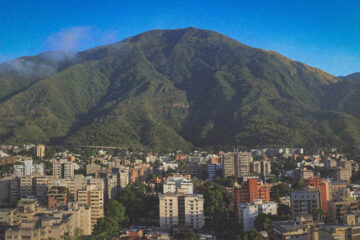And thus here we stand, two weeks after Venezuela went through the worst blackout in its history. We still do not have an official and formal explanation of what happened; Maduro’s regime has adhered to the ‘Cyber and Electromagnetic attack’ buzzword narrative that places the blame on America, Donald Trump, and Marco Rubio—anyone except themselves, that’s how they roll.
One of the more plausible theories on the table involve a wildfire that affected the three 765 kV transmission lines, a fire that was exacerbated due to the lack of field maintenance and/or proper grass pruning; the blackout happened because Guri’s three 765kV lines were disrupted by the fire, this old hydroelectric power plant located in Bolivar State is responsible for 80% of our power generation.
If you were to ask me, I’d say the whole incident serves as a testament to the regime’s pathological negligence. All things considered though, whatever truth lies behind this incident doesn’t matter much anymore; over the past two decades Venezuela has grown accustomed to fast news cycles that involve outrageous scenarios and scandalous incidents. The blackout is already a past memory for most and it won’t be long before some new incident takes the spotlight.
Slowly but surely, the Venezuelan show has returned to its regular scheduling; things have returned to a sense of normalcy (within the Venezuelan context) following that torturous weekend. The area I live at hasn’t gone through another blackout since then *knocks on wood*, however, constant brownouts plagued the first days after power was restored to the area, they’re less common now but still just as annoying—one so far this Sunday.
Internet has been rather unstable as well, but at least it works. There are areas that have it worse when it comes to this—and well, once things had stabilized enough, hyperinflation gave us a gentle reminder of its existence.
While most prices have remained relatively stable through the month (since the economy was basically frozen in the days that followed the blackout) some items that hadn’t gotten price updates suddenly tripled in price this past week, while others received price bumps that should be cause of outrage in other countries but have become normal to us.
It would seem like life is back to our usual agenda in Caracas—for the most part at least. Blackouts continue to happen across the capital district; overloads have damaged the power grid in certain areas, leaving some citizens in the dark.
A friend of mine who doesn’t live too far from here hasn’t had power in almost a week, and the outlook doesn’t seem too bright—they informed the residents of that area that it will take at least two more weeks to repair the damaged equipment and restore power.
It’s easy to take a quick glance at Caracas and think that everything’s back to “Venezuelan normalcy” when there’s still areas without electricity and water.
Dreaming of water
When it comes to water and the complete disruption of its distribution during the blackout, it has and continues to be a polarizing experience across the country. The building I live at had dwindling water resources following the blackout, we collectively agreed to only use up to thirty minutes of water per day in order to stretch the hell out of the tank.
We started to receive running water during the afternoon of March 13th, which coincided with our regular ration schedule. My brother and I carried out our usual “Yay, water days” routine from Wednesday evening until Saturday evening. I even availed myself of running water on that Sunday midnight to cook enough rice for a few days—and then came the shocker.
Usually, our running water ration ends every early Sunday, which forces us to rely on the building’s tank (up to two hours per day at most), that has been a normal thing in our lives for around five years now, except that it wasn’t the case on the 17th of March, much to the collective surprise of everyone who lives in this building.
The neighbors with access to the water tank and pipes constantly checked, water continued to be supplied through the day and no one could believe it. We took it easy during that Sunday, had a long shower, we had all dishes clean before sunset, it was a great day. I woke up on Monday and was amazed when I found out that we still had running water.
We did dishes right away after lunch, something we can’t normally do until hour 8pm water ration hour. I felt uneasy, we had water and I had this imperious necessity in my mind to make the most out of it but the thing is that there was nothing to do. Dishes were clean, laundry was done, the apartment was clean, and all of our reserve buckets/bottles/pots were full.
That’s when it clicked on me, I’ve become so accustomed to water shortages and rations that the moment you throw a semblance of normalcy on my life (in this case, water on days that we usually don’t have it) then you completely throw me out of balance.
My entire life has been adapted to a routine of lines, rations, shortages, and all sorts of woes that I legitimacy felt strange and out of place when presented with ‘normality’.
I had completely forgotten what it felt like to have running water 24/7. This Cinderella dream ended this Sunday though, back to the rigorous rations it is. Ten whole consecutive days with water, it was too good to be real.
I’m assuming that they temporarily suspended the rationing in order to placate emotions and quell the growing groups of protesters that demanded access to water; this is the capital city and all that, it sounds unjust but there’s some prerogatives inherent to living in Caracas that other cities don’t count with.
There’s places in Venezuela that haven’t received running water in months, they’ve had to rely on very costly water trucks and other less healthy methods to obtain water.
Vecinos de Cacique Mara, en Maracaibo, estado Zulia, manifiestan que por causa del desabastecimiento de agua a sus hogares deben tomar agua de huecos que encuentran en la vialidad para poder cubrir sus necesidades de aseo. Reportó: @mariacquintero #23Mar pic.twitter.com/TL0ETJS1mn
— VPItv (@VPITV) March 23, 2019
The Zulian Disaster
Zulia, my beloved Birthplace State and erstwhile seat of power of my mother’s side of family has suffered the worst. Blackouts have plagued this State for over a decade as the infrastructure began to systematically collapse, power is heavily rationed for hours every day.
The damage caused to the battered power infrastructure paved the way for long daily blackouts that can last up to sixteen hours. The long blackout was even longer in Zulia, they had to go through over 100 hours without power.
The lack of power during those days opened the way to collective despair, that despair turned into rage, and that rage gave forth to widespread anarchy and chaos. Dozens upon dozens of commercial establishments were looted, many of which suffered irreparable losses.
It pains me to see Zulia in such a dire state, I was born there; the best years of my life took place in Maracaibo.
Two weeks after that terrible blackout and we haven’t fully recovered yet.
Setting aside the woes derived from our collapsing power and water infrastructure, the shroud of uncertainty derived from the political crisis that began earlier this year still covers the country. We still have two presidents and we aren’t one hundred percent sure of what’ll happen in the immediate future.
While still unlikely, the prospect of a US or foreign intervention has been not so subtly mentioned in recent days as a way to exert pressure into the Regime. Meanwhile, the war for assets continue overseas, its goal remains the same: to strip Maduro and his government of financial resources.
The government is playing his cards behind the table and biding their time; they can (and will) try to withstand and stall as much as possible all the way through the end of 2019, where we’d have to hold parliamentary elections and renew our legislative branch.
You can safely bet that they’ll try to push for these elections whilst wearing a ‘good democratic guys’ disguise, at the same time they’ll try to rig them all the way so that they can gain control of the only branch of power not currently in their grasp.
The opposition, now spearheaded by Juan Guaido, continues their war of attrition against Maduro, all they gotta do is produce more tangible results and not squander the faith and trust of their followers.
Whatever happens is ultimately beyond my control, so I guess I will focus on my plans instead now that I have a clearer path. Gotta get all pieces of this puzzle so that I can proceed with my masterstroke before things get real.
February and March were very complex months for Venezuela, all I hope is that April is a more ‘normal’ month for us, whatever that means nowadays…
-Kal


